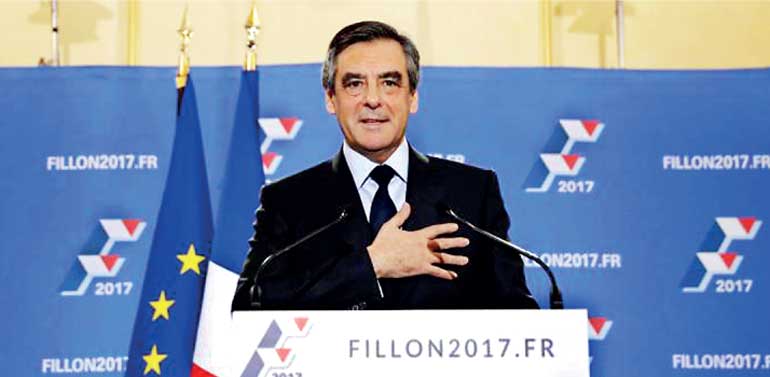Friday Feb 20, 2026
Friday Feb 20, 2026
Tuesday, 29 November 2016 00:02 - - {{hitsCtrl.values.hits}}
Reuters: Hardline reformist Francois Fillon scored a resounding win in France’s conservative primaries on Sunday, making him favourite to win a presidential election five months from now against the popular far-right and a deeply divided left.
Fillon, a former prime minister who wants to raise the retirement age, cut back social security and scrap the 35-hour working week, would easily beat National Front leader Marine Le Pen in a run-off second round, a flash opinion poll said right after his primaries victory.
But to do that, the 62-year old former prime minister and admirer of late British Prime Minister Margaret Thatcher now faces the challenge of bringing voters behind a programme that promises radical change.
“I must now convince the whole country our project is the only one that can lift us up, for jobs, growth and to fight those fanatics that declared war on us,” a visibly moved Fillon said at his campaign headquarters.
“I will take up an unusual challenge for France: tell the truth and completely change its software,” said Fillon, a racing car enthusiast who lives in a Loire valley chateau.
With votes from nearly all of 10,229 polling stations counted, Fillon had won 66.5 percent of the votes in the primaries organised by the centre-right Les Republicains party.
Next year’s presidentials in the euro zone’s second-largest economy are shaping up to be another test of the strength of anti-establishment parties in Western countries, with French voters angry with stubbornly high unemployment and fearful after a wave of Islamist militant Attacks.
In a country that saw months of street protests earlier this year against labour reforms that are much milder than those Fillon proposes, his far-reaching plans give both the ruling Socialists and Le Pen’s National Front (FN) some hope that they can make a comeback.
 Francois Fillon, former French prime minister and member of Les Republicains political party, delivers his speech after partial results in the second round for the French center-right presidential primary election in Paris, France, 27 November, 2016 – REUTERS
Francois Fillon, former French prime minister and member of Les Republicains political party, delivers his speech after partial results in the second round for the French center-right presidential primary election in Paris, France, 27 November, 2016 – REUTERS
Up until a couple of weeks ago they expected the centre-right candidate to be Alain Juppe, a more moderate proposition who had been a favourite in polls for months.
“For us, he’s a great candidate (to face in the ele ction),” the National Front’s Florian Philippot told Reuters. “His project is so sharply different from ours.”
Under the leadership of Le Pen, who took over from her father Jean-Marie in 2011, the FN has switched from an economically liberal, pro-small business party to one that promises to lower the retirement age and guarantee France’s generous welfare safety net.
Fillon plans to slash public spending by 100 billion euros over five years, scrap a tax on the wealthy and push the retirement age to 65 as well as increase VAT sales tax.
“It’s a programme of chaos. It’s impossible that this austerity cure does not trigger chaos,” Philippot said.
All eyes now turn to whether the deeply unpopular President Francois Hollande will decide to run for the left-wing ticket in his party’s primaries in January, amid signs that his prime minister, Manuel Valls, is considering a bid of his own.
Close aides of Hollande have said he will run despite his deep unpopularity. Fillon lacks the broad appeal of the more centrist Juppe and his more radical economic reform plans could give Hollande a peg on which to base his candidacy.
But on Sunday, Hollande’s Prime Minister Manuel Valls for the first time raised the prospect he could challenge Hollande as the Socialists’ candidate in the 2017 presidential election, in a further sign of the left’s divisions.